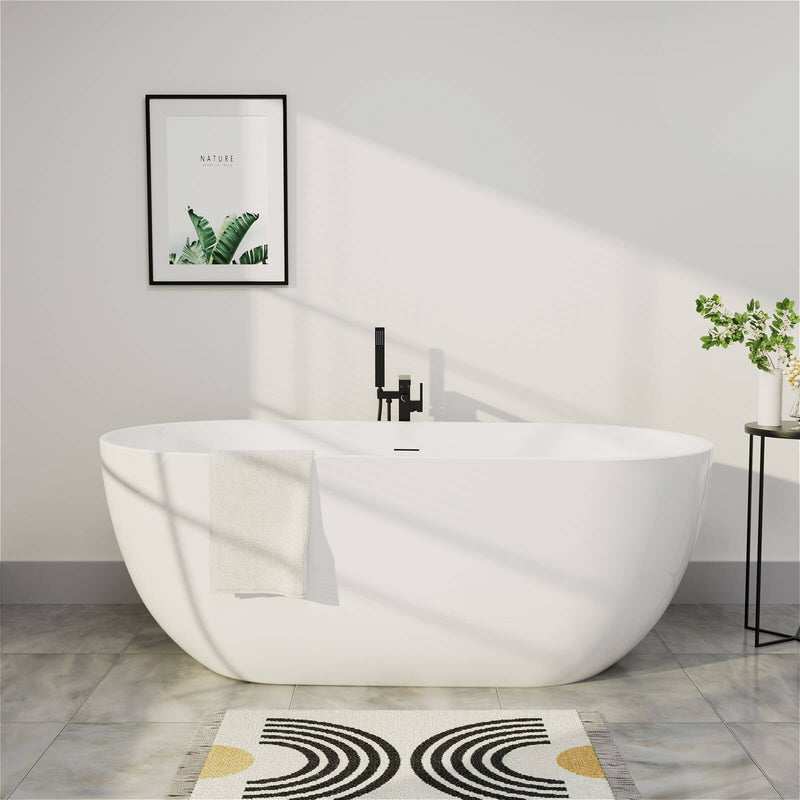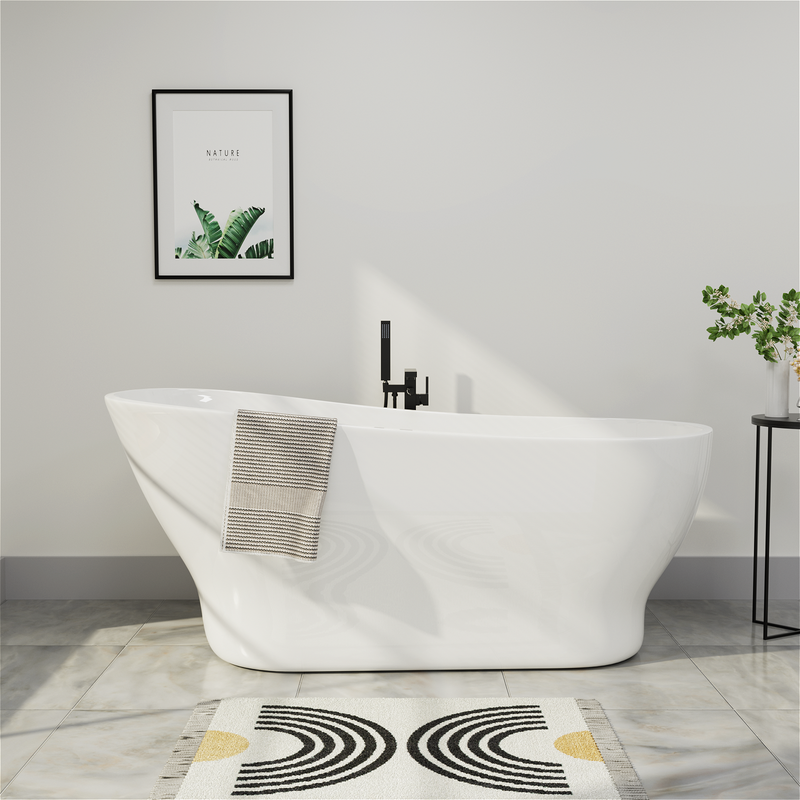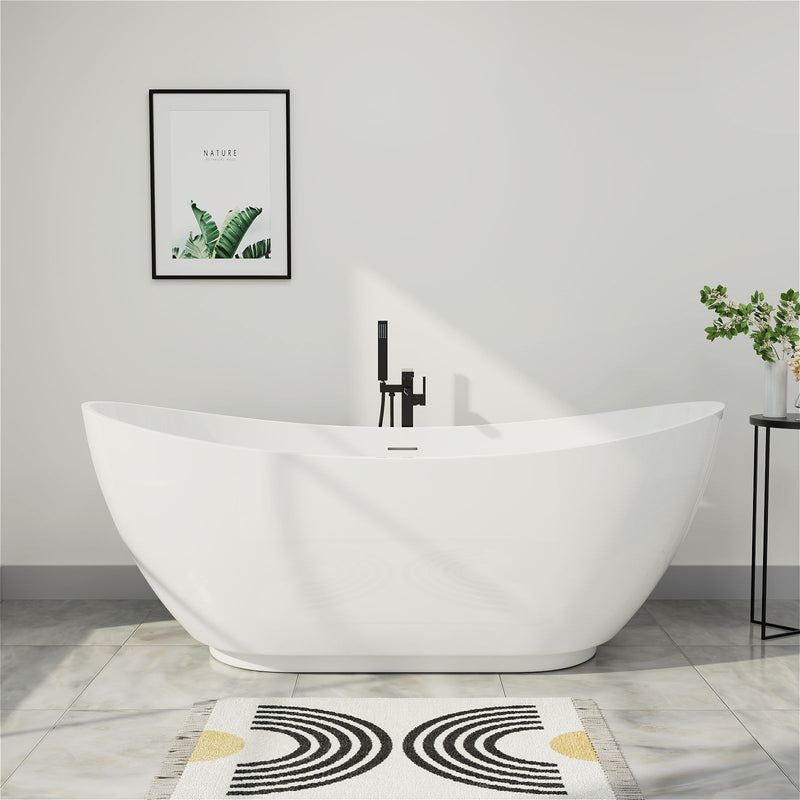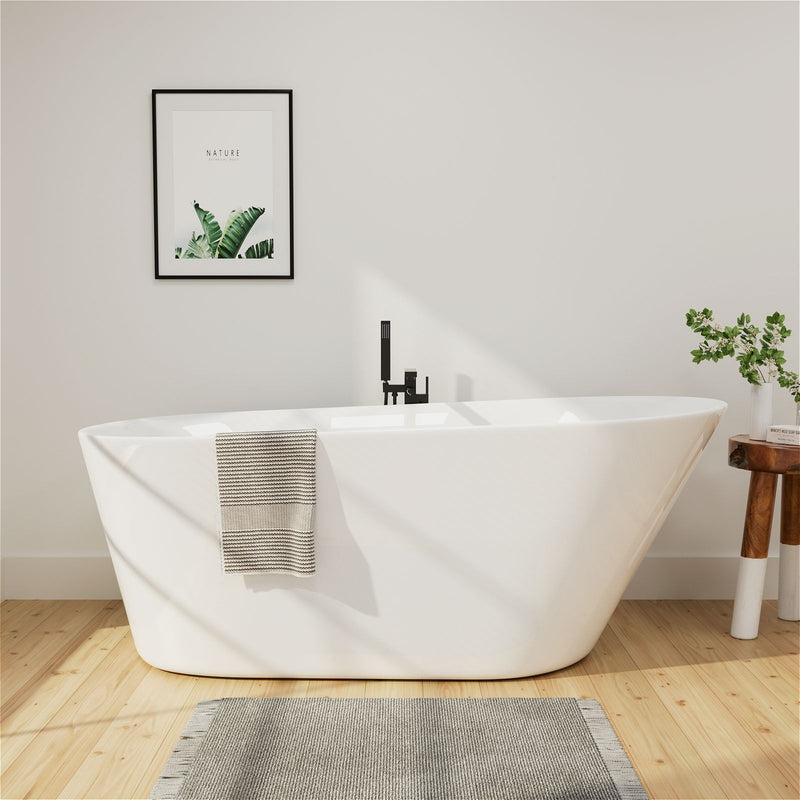In modern bathroom design, massage bathtubs have become an important choice to improve the quality of life. As the two mainstream types on the market, Air Tub and Whirlpool Tub each have unique working principles and user experiences. This article will deeply analyze the key dimensions of these two bathtubs, from working principles to maintenance costs, from therapeutic effects to installation requirements, to provide you with a detailed buying guide to help you make an informed decision based on your personal needs and family conditions.
What is an Air Tub?
Air tubs, sometimes also called bubble baths or bubble massages, are popular for the hot air massage therapy they provide. Warm air is ejected through its multiple pinhole nozzles, releasing millions of tiny, invigorating champagne-like bubbles that instantly surround your body.
The jets of air tubs are much smaller than those of whirlpool tubs, so they feel gentler and are perfect for soft tissue massage. Its soothing bubbles can easily relax your entire body, giving you a "weightless" feeling as if you are floating in water.
What is a Whirlpool Tub?
Unlike air tubs that use warm air, whirlpools or massage bathtubs have powerful jets that spray water, providing a deep and targeted hydro massage that can easily eliminate muscle tension and a day's anxiety.
These nozzles are strategically placed in the bathtub and are adjustable, giving you the option to control the direction and pressure of the water - from gentle to strong pressure.
Core Working Principle Comparison
How Air Tub Works
Air Tub, its core technology relies on a compressed air system. The working principle is that the outside air is filtered and heated through the built-in high-efficiency silent air compressor, and then released through dozens or even hundreds of micro air holes distributed on the side walls and bottom of the bathtub. These air holes, which are usually 0.8-1.2mm in diameter, produce thousands of tiny bubbles, forming the so-called "bubble bath" effect.
Technical Features
Bubble diameter: 0.1-0.3mm (close to the size of human pores)
Working pressure: 0.03-0.05MPa
Water temperature adaptability: the best effect is at 36-38℃
Typical number of pores: 50-200
The bubbles generated by air massage will burst slightly when they touch the skin. This micro-vibration can stimulate the tactile receptors on the surface of the skin and promote local blood circulation. Compared with the traditional Whirlpool Tub, the water flow impact of Air Tub is gentler, especially suitable for people with sensitive skin and the elderly.
How Whirlpool Tub Works
Whirlpool Tub, at its core, is a high-pressure water pump system. The system uses a water pump with a power of between 1-2HP (some high-end models can reach 3HP) to suck the water in the bathtub and spray it out forcefully through nozzles with adjustable directions. These nozzles are usually distributed at the positions corresponding to key acupuncture points and muscle groups of the human body.
Technical Parameter
Nozzle pressure: 0.1-0.3MPa
Number of standard nozzles: 6-20
Water flow rate: up to 15-20L/min
Massage depth: can penetrate 2-3cm of subcutaneous tissue
Whirlpool Tub's nozzle design is very particular, and common types include:
Rotating nozzle: 360-degree adjustable direction
Pulse nozzle: simulates the rhythm of acupressure massage
Combination nozzle: outputs air and water at the same time
Hydraulic massage can act more directly on deep muscle tissue, and is more effective in relieving muscle soreness and promoting metabolism. But relatively speaking, it is also more irritating to the skin and is not suitable for long-term use every day.
Multi-Dimensional Evaluation of Comfort and User Experience
Physical Comfort Comparison
Air tub's Superior Experience
All-round wrapping feeling: hundreds of bubbles act at the same time to form a uniform massage effect
Silent enjoyment: the average noise is only 40-50 decibels (equivalent to the sound of drizzle)
Water temperature maintenance: small bubble disturbance, the water temperature only drops by 1-1.5℃ per hour
Skin-friendly: no strong water flow directly impacts, sensitive skin can also be used daily
Whirlpool tub's Unique Feeling
Deep massage: the water flow can accurately act on the sore points (such as shoulders, neck, and waist)
Adjustable intensity: Most models provide 10-100% intensity adjustment
Thermal therapy effect: high-speed water flow promotes heat conduction and muscles relax faster
Psychological satisfaction: obvious water flow power brings a stronger "massage" feeling
Typical User Scenario Analysis
Air tub is more suitable for:
Daily use before bedtime relaxation
People with sensitive skin or the elderly
Aromatherapy enthusiasts (bubbles help diffuse essential oils)
People who like a quiet bathing environment
Whirlpool tub is more recommended for:
Muscle recovery after exercise
Patients with chronic muscle strain
People who pursue professional SPA experience
People with stiff joints (such as arthritis patients)
Analysis of Health Benefits and Medical Value
Therapeutic Effect from a Medical Perspective
The medical value of air tub:
Improvement of microcirculation: Micro-vibration generated by bubble bursting can increase skin blood flow by 40-60%
Lymphatic drainage: Gentle pressure helps lymphatic fluid return and reduces edema
Skin metabolism: Promotes keratin renewal and has auxiliary therapeutic effects on skin diseases such as psoriasis
Respiratory system: High oxygen content in air helps relax the respiratory tract
Therapeutic advantages of whirlpool tub:
Deep tissue relaxation: Water pressure can penetrate into the muscle layer and relieve spasms
Pain point targeted treatment: The nozzle can be precisely adjusted to the painful area
Joint range of motion: The combination of hot water + water flow can increase the range of joint motion by 15-25%
Metabolism promotion: 30 minutes of hydrotherapy can increase the basal metabolic rate by 10-15%
Applicable People and Contraindications
Air tub's absolute advantage population:
Varicose vein patients (no direct water flow pressure)
Patients recovering from burns
Patients with fibromyalgia syndrome
Pregnant women (doctor's confirmation required)
Whirlpool tub is especially recommended for:
Athletes' training recovery
Chronic back pain
Postoperative rehabilitation (non-wound site)
Patients with spinal stiffness
Common contraindications:
Severe cardiovascular disease
Open wounds
Hypertension
Acute inflammatory period
Professional advice: The American Physical Therapy Association recommends that any therapeutic use should follow the "20-minute rule" - no more than 20 minutes per use, no more than 2 times a day, and the water temperature should be controlled below 38°C.
A Practical Guide to Installation Requirements and Space Planning
Comparison of Basic Installation Conditions
Installation features of air tub:
Power requirements: dedicated 15-20A circuit (compressor power is usually 1-1.5KW)
Air supply system: air inlet must be unobstructed (some models require external air pipes)
Space requirements: 30cm maintenance space must be reserved outside the bathtub
Waterproof level: control panel must meet IPX7 standards
Additional requirements for whirlpool tub:
Water pressure requirements: water inlet pressure ≥0.1MPa
Drainage slope: the drainage pipe must maintain a slope of ≥2%
Structural reinforcement: full water weight can reach 500-700kg, floor load-bearing ≥800kg/m²
Pipe disinfection: It is recommended to use a special disinfectant to clean the pipes monthly
Space Layout Plan
Solution for small bathrooms (4-6㎡):
Choose a corner installation model
Use semi-embedded installation to save space
Give priority to Air Tub (usually more than Whirlpool Tub is 10-15% smaller)
Optimization suggestions for medium-sized bathrooms (6-10㎡):
Freestanding placement creates a spa atmosphere
Reserve at least 80cm of passage space for Whirlpool Tub
Consider models with seat design
The perfect match for luxury bathrooms (10㎡+):
Install Whirlpool Tub in a central island
Combined steam room and shower area
Install a multi-function control panel (such as a touch screen or smart home linkage)
Maintenance and Long-Term Use Cost Analysis
When it comes to maintenance, whirlpool tubs require more care than bubble baths. Bubble bathtubs have a built-in "automatic purification cycle" and air is blown in through the pipes when the bathtub is drained to prevent mold and bacteria from growing. At the same time, whirlpool jets require more thorough cleaning because they are more likely to accumulate dirt, grime and mold. Whirlpool users are advised to avoid using bath oils and bath salts, as they can easily clog the pipes and even damage the motor. Nevertheless, the bubble baths and whirlpool bathtubs we provide are antibacterial and guaranteed to be free of bubble bath essentials.
It is a common belief that air baths are "cleaner" or more sanitary than whirlpool baths, but this is not true, both can be "clean" or "troublesome" depending on how they are designed and maintained. To get the most out of your bathtub and extend its life, choose a high-quality one and take care to clean and maintain it regularly.
Daily Cleaning Tips
Maintenance key points of air tub:
Pore cleaning: clean the pores with a special needle every month (the matching tools are usually provided with the bathtub)
Filter replacement: replace the air filter every 6-12 months
System dehumidification: run the "dry run" mode to prevent internal moisture when not in use for a long time
Maintenance of whirlpool tub:
Nozzle removal: remove the nozzle and soak it in a 1:10 white vinegar solution every quarter
Pipe disinfection: use a special disinfection tablet to clean it monthly
Pump maintenance: check the pump seal every year and replace it if necessary
Ultimate Buying Guide: 7 Key Decision Factors
Frequency of use: choose Air Tub for high-frequency daily use, and choose Whirlpool Tub for targeted treatment
Space conditions: Small space gives priority to Air Tub, large space can choose freely
Budget range: If the budget is limited, you can start with a high-quality Air Tub, and consider high-end Whirlpool Tub for long-term investment
Health status: Choose Whirlpool Tub if you have specific muscle problems, and choose Air Tub if you need to relax your whole body
Maintenance ability: Users who are afraid of trouble are more suitable for Air Tub, and those who are willing to perform regular maintenance can choose Whirlpool Tub
Home Style: Modern minimalist style with Air Tub, classic luxury style with Whirlpool Tub
Resale Value: High-end Whirlpool Tubs usually retain their value better
Professional Tip: Before making a final decision, be sure to visit a physical showroom to experience the actual massage feeling of different models in person, paying special attention to:
Sitting comfort (especially lumbar support)
Ease of use of the control panel
Noise level during operation
Ease of getting in and out of the tub
No matter which type you choose, a high-quality massage tub will be a long-term investment in your family's health. With proper use and maintenance, a high-quality Air Tub or Whirlpool Tub can provide 10-15 years of comfort, and the average daily cost may be less than a professional massage. Start planning your private spa paradise now!





